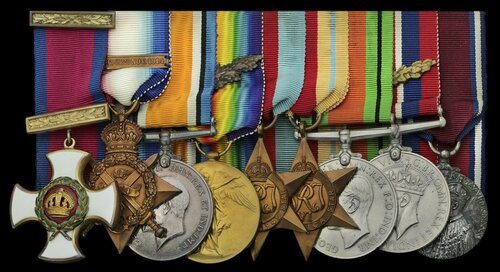
Auction: 21002 - Orders, Decorations and Medals
Lot: 223
A most unusual Great War D.S.O. group of nine awarded to Captain A. J. Brown, Royal Army Medical Corps, later Wing Commander, Royal Air Force
Brown was captured during the Retreat from Mons in 1914 and rendered remarkable service - being decorated - at Gardelegen Prisoner of War Camp during the typhus outbreak amid squalid conditions in the Spring of 1915; he was subsequently released from captivity
Distinguished Service Order, G.V.R., silver-gilt and enamel, top riband bar adapted for wear; 1914 Star, with clasp (Lieut. A. J. Brown. R.A.M.C.); British War and Victory Medals, with M.I.D. oak leaves (Capt. A. J. Brown.); 1939-45 Star; Africa Star; Defence and War Medals 1939-45, with incorrect M.I.D. oak leaves; Jubilee 1935, good very fine (9)
D.S.O. London Gazette 2 November 1916. One of 2 awards of the D.S.O. for these events, with Major P. C. T. Davy earning a C.M.G.:
'In recognition of their distinguished service and devotion to duty during the spring and summer of last year in the Prisoners-of-War Camp at Gardelegen, Germany.'
Arthur James Brown was born on 26 May 1884 and was educated at Woolstone College, Hampshire, University College, Southampton and the London Hospital. During the Great War he served in France from 16 August 1914 and was captured during the Retreat from Mons. Brown was thence taken and imprisoned at Gardelegen in Germany. During 1915, a number of typhus outbreaks began in the POW Camps and it fell upon the shoulders of the Medical Officers to care for their men. Further details followed in the Evening Mail of 3 November 1916:
'The story of the self-sacrifice of these three Officers was told in the report of the epidemic at Gardelegen by the Government Committee on the Treatment by the Enemy of the British Prisoners of War, published on October 25. The epidemic lasted four months, during which there were 2,000 cases of typhus. The Germans displayed the same callousness and cowardice and the British and Allied Doctors the same heroic devotion to duty as were shown by their respective compatriots in similar distressing circumstances at Wittenberg. Of the 16 Allied Doctors in the camp, 12, including Major Davy, took the fever and 2 died.'
The same day, the Daily Mirror also ran the story and quoted Davy's report:
'The men lived, slept and fed in huts devoid of any furniture. They walked over each other in passing in and out. There they lay, sick, and later died cheek by jowl with their fellow prisoners. The overcrowding was such as I have never before seen or imagined anywhere.'
It seems Brown was released after the epidemic in July 1915 and went on to serve in the Cameroons Campaign, also being awarded the Gold Medal of the Order of St John.
Before War's end, Brown was 'mentioned' for service in Egypt (London Gazette 5 June 1919, refers) and after its conclusion transferred to the Royal Air Force, being appointed Squadron Leader in 1922. He remained in the service and was awarded the 1935 Jubilee Medal whilst Wing Commander, Principal Medical Officer at Headquarters, Western Area Command. Returned to the fold during the Second World War, the gallant Wing Commander died on 20 October 1949 (British Medical Journal, 18 February 1950, refers); sold together with copied research and an old Spink Auction extract, circa 1985, when these awards were last offered for Sale.
See https://paperspast.natlib.govt.nz/newspapers/OAM19170109.2.46 for more details on the events in the POW Camp and the shocking conditions endured.
Subject to 20% VAT on Buyer’s Premium. For more information please view Terms and Conditions for Buyers.
Sold for
£2,400
Starting price
£1200




